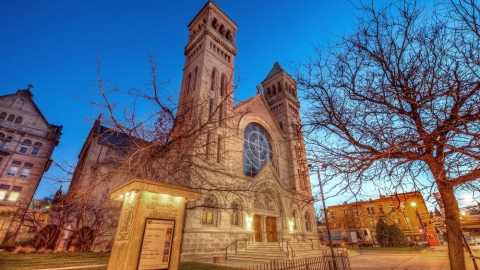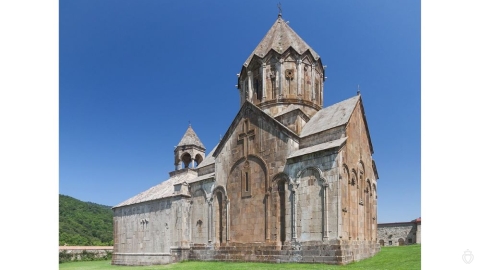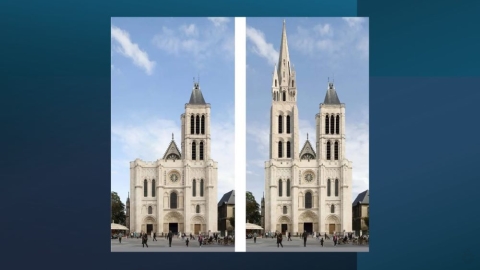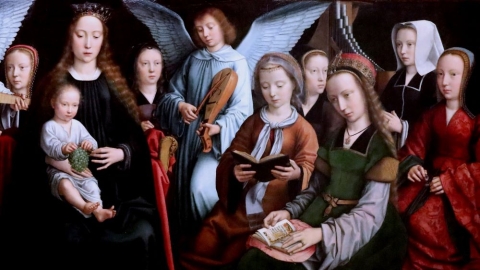Seventh Centenary of the Canonization of St. Thomas Aquinas (4)
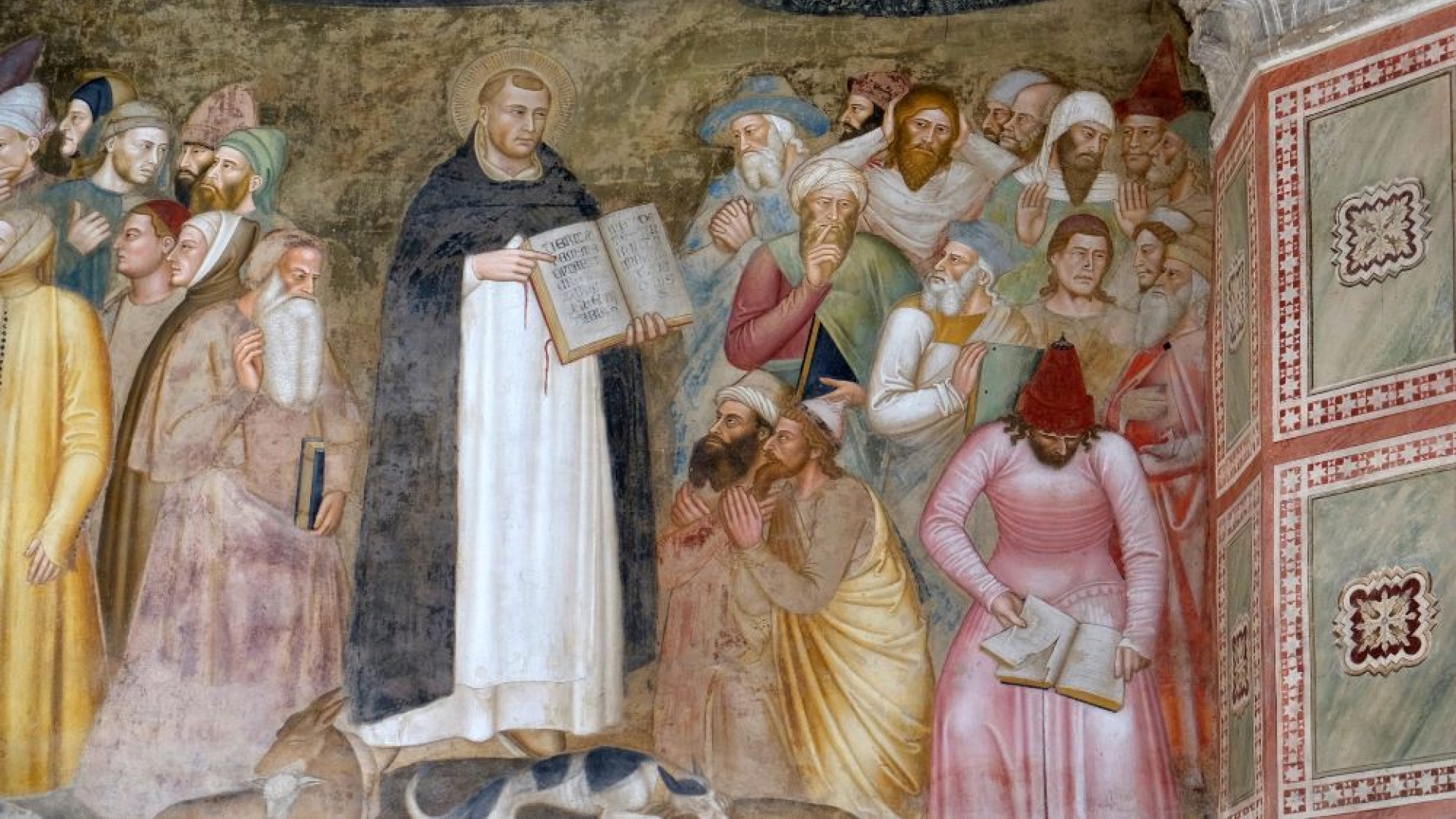
St. Thomas refuting the heretics
On the occasion of the 700th anniversary of the canonization of the Angelic Doctor, FSSPX.News is publishing several texts showing the place of the Common Doctor in theology and in the teaching of the Church. This text is the papal bull Redemptionem misit of Pope John XXII for the canonization of St. Thomas Aquinas.
This document is of major importance for the Church. This canonization opened a very wide path to the doctrine of the holy Doctor which would not cease to be fruitful throughout the ages and would be always more strongly recommended by the popes.
John, bishop, servant of the servants of God, to all the venerable brother patriarchs, archbishops and bishops, as well as to his beloved sons abbots, priors, deans, archdeacons, archpriests, and other prelates of the churches to whom this letter will reach, greetings and apostolic blessing.
The Lord sent redemption to His people [1], when the Word of God was conceived with the cooperation of the Holy Ghost, in the womb of the Virgin, mysterious nuptial chamber, and became flesh and dwelt among us [2], instructing us by His word, teaching us by His example, manifesting heaven to us, revealing His mysteries to us, confirming His doctrine by the miracles He had done, confirming all things by the testimonies of the Holy Word, who announced that these things would happen.
Finally, offering Himself to God His Father on the altar of the Cross as a victim for an odor of sweetness [3], He washed away our sins with His sacred Blood [4], He descended into the underworld and plundered hades, He rose from the dead on the third day [5], He appeared to His disciples for forty days and spoke of the Kingdom of God [6], He ascended to heaven under the admiring eyes of His disciples [7], He led the captives and made gifts to men [8].
He let them know that the gate of Heaven, hitherto closed, was finally open in heaven to those who believed in Him. Heaven is therefore open to the faithful, to the humble, and especially to those who have voluntarily consecrated themselves, by the vows of chastity, poverty, and obedience, to God from whom the foolish have turned away. “The kingdom of heaven suffereth violence, and the violent bear it away”[9], because those who dominate their own affections tend with some violence towards higher realities.
2. It is thus that Blessed Thomas Aquinas, of the Order of Friars Preachers, doctor of sacred theology, a man of noble family, but of an even greater nobility of soul, of illustrious fame, of a most worthy life, capable, even before puberty, of attentive meditation and deliberation, received the habit of the Order of Preachers [at the age of 19], remaining even more firm in this design, when he withstood the obstacles set before him by his own father opposed to his happy decision.
After his religious profession, he soon made such progress in knowledge, life, and virtue that he was ordained a priest while still young and began to teach theology in Paris, the most famous city of all, where he occupied with great esteem, for several years of his career, the chair of Master, which was a great honor for himself, for his Order, and for the University of Paris.
Indeed, by his virtuous life he acquired a reputation, he produced a sure doctrine with works written in such a short time, but which had a great diffusion and aroused legitimate admiration, so that the words of the Psalm truly apply to him: “Thou waterest the hills from thy upper rooms: the earth shall be filled with the fruit of thy works” [10].
This is the theme the saint chose to begin his teaching on Sacred Scripture. It is said that it was given to him by a revelation, after he had said his prayers, at the time when he believed himself unfit for teaching because of his youth, when he was wondering what he was going to propose as the theme for his inaugural class.
3. And because he did not want to remain idle, but to cultivate the land [11], he wrote works on the first sciences and on the various parts of philosophy, also on the Holy Scriptures, both the New and the Old Testament, and many other works for the glory of God, for the increase of faith, and the instruction of students, all clear, with science, reputation, and wisdom, not without the infusion of a special gift of grace. Indeed, for prudent men, learning is easy [12], and the absolute sign of one who is wise is the ability to teach [13].
4. This sage was able to accomplish such a work because he turned away from all ambition for earthly goods and aimed for heavenly goods. He certainly spent all his time studying the things of God and renouncing earthly goods to obtain eternal goods.
And he began with the things of God so as to fortify himself in the things of the School, because, each day, before going up to the lectern to give his lesson or to do other things, he celebrated a Mass and heard another one, or if he did not celebrate, heard two entire ones. In the Masses and also in other acts of prayer, to which he was assiduous, he revealed, by the shedding of tears, the docility and devotion of his soul to God, from Whom nothing is hidden.
5. In any case, with the brilliance of his chastity, he illuminated, in pious moderation, that humility which he kept and that same attentive sobriety which he maintained, in such a way that many thought he had kept the virginity of his flesh intact.
This was affirmed by a pious confessor of the aforesaid Order, after having heard him at length in confession, which he gave in public and in the presence of all, on the day of his death, this credible testimony which has come down to us: I have heard the general confession of this holy man, of which I testify, for he came to me pure as a child of five years old, because he never knew corruption in his flesh.
Moreover, this man of God, contented himself with the food and the common clothing of the monks; he was of a gentle character, a delicate kindness, a pious mercy, submissive to humility and adorned with so many other virtues; he had no regard for honors, and kept cautiously away from cohabitation with women.
He was not haughty, and showed no desire to dominate, nor to dispute, for even in disputes he kept himself from boasting and kept quiet in discussions, avoiding pedantic language, even when the syllogistic dispute was used as a resource by others.
This is why this servant of God was concerned with divine works and was in everything exquisite. He excelled in scholarship, was moving in preaching, devout in prayer, profound in writing, and devoted himself to all this with assiduity, so that apart from natural necessities, or the hour of rest, he had no free time left.
6. Finally, the day approached when he was to pass from this world to the Lord; after having conquered and triumphed over the world, he was received into everlasting eternity, the country [14], “for the fruit of good labors is glorious” [15]. Coming from Naples, where he was then teaching as a Doctor, as always with great fame, he went by the coast to the Council of Lyons, to which, it is said, he had been invited because of his eminent knowledge, by Our Predecessor of happy memory, Pope Gregory X.
When, a few days before the Council, he arrived at Fossa Nova Monastery, of the Cistercian Order, in the diocese of Terracina, he felt a little ill and piously asked to be taken to the Monastery. Entering the monastery, filled with the Spirit of God, he then pronounced these words: “This is my rest for ever and ever: here will I dwell, for I have chosen it.” [16]
This turned out to be true, as evidenced by the tomb in which his holy body was buried. It was there that his illness began to worsen and gradually cause him to lose strength. Although his illness lasted for many days, he bore it without any sign of impatience, but with an even soul, keeping total humility, bearing the illness with a serenity which alleviated his infirmity; he strove to please God by obedience, and performed his duties himself.
And it won the respect of those who did not serve him, for he gave all an example of patience to imitate; this is why the brothers of this same Fossa Nova Monastery, who served God with great devotion, seeing in this holy man the virtues of religion, willingly offered him their services, because they saw him accomplishing them with total resignation in his bodily infirmity.
Some of them gladly carried pieces of wood from the forest on their shoulders, others anything that could be useful to him, because they did not think it appropriate that the animals should carry the things which were necessary to him, and that they should give this assistance to him who had the prerogative of so many virtues.
7. And when, in that same infirmity by which he died, he took for nourishment of his soul, as viaticum, the most holy body of our God and Lord Jesus Christ, his soul, accustomed to taste the sweetness of God, melting with him in sweet love, shed a profusion of tears.
And among the various beautiful words he uttered, his faith and devotion inspired him with the following, which he uttered in front of the entire community of this monastery and in the presence of many brothers of the Order of Preachers and the Order of [Friars] Minors, who assisted him:
I have taught many things on the subject of the Most Holy Body of Our God, Our Lord Jesus Christ and on the other sacraments, on the many things I have written on faith in Jesus Christ and on the Holy Church Roman, to which I submit and expose everything for correction.
He then received, alongside this same living Sacrament, the other sacraments of the Church, with due veneration and with an outpouring of tears, and three days later he fell asleep in the Lord, in whom he believed, whom he loved and cherished with all the tenderness of his soul.
The faithful and prudent servant [17], is not obstinate in his own ways, nor in his own senses or in his beginner's prudence, and he is not haughty with his knowledge which comes from his opinion, because he who pursues majesty will be overwhelmed by glory [18].
The Doctor also acted with wisdom and humility, in the fidelity of his devotion, submitted, as we have said, all his doctrine, oral and written, to the rule of the faith of the Church herself, spoken by the mouth of Peter, whose stability he knew would never be shaken by the winds of human agitation; for after having recognized the Divinity of Christ in these terms:
“You are the Christ, the Son of the living God” [19], Peter deserved to hear these words: “You are Peter, and on this rock I will build my Church” [20]; and in another place: “I have prayed for you Peter, that your faith should not fail” [21]; now, if Christ prays for Peter, it is for His Church that He intercedes.
He can be declared a saint.
8. For it is true, worthy and becoming that he whom God has covered in this life with so many graces and gifts, once taken up into heaven, He declares him holy in the eyes of men; He makes him shine again after his departure from this life, although even before we have kept the memory of more than one marvel, by so many great miracles, so many dazzling prodigies, that these words of the Psalm can rightly be applied to him:
Know that the Lord has brought to light His saint [22], and so his life has witnessed his miracles, and his miracles have witnessed his life[23]. For the glory of God, the exaltation of the saint and the edification of the faithful, We have inscribed in this Bull, among the many the miracles, certain ones attested by appropriate witnesses.
[1] Ps 110:9.
[2] Jn 1:14.
[3] Cf. Eph 5:2 and Phil 4, 28.
[4] Cf. the Exultet at the Easter Vigil.
[5] Cf. 1 Cor 15:4 and the Apostles' Creed.
[6] Acts 1:3.
[7] Cf. Acts 1:9.
[8] Eph 4:8.
[9] Mt 11:12; see Luke 16:16.
[10] Psalms 103:13.
[11] Cf. Gen 2:5.
[12] Prov. 14:6.
[13] De sancti Thomae prudentia in consiliis dandis cf. De Tocco, Vita, c. 35; A. M. Jacquin
O.P., Le prudentissime Frère Thomas, [the prudence of Br. Thomas] Friborg 1924.
[14] Cf. Dan. 12:3.
[15] Wis 3:15.
[16] Psalms 131:14.
[17] Mt 24:45.
[18] Prov. 25:27.
[19] Mt 16:16.
[20] Mt 16:18; Lk. 22:32.
[21] Lk 22:32.
[22] Psalms 4:3.
[23] Jn 1:8.
Pope John XXII
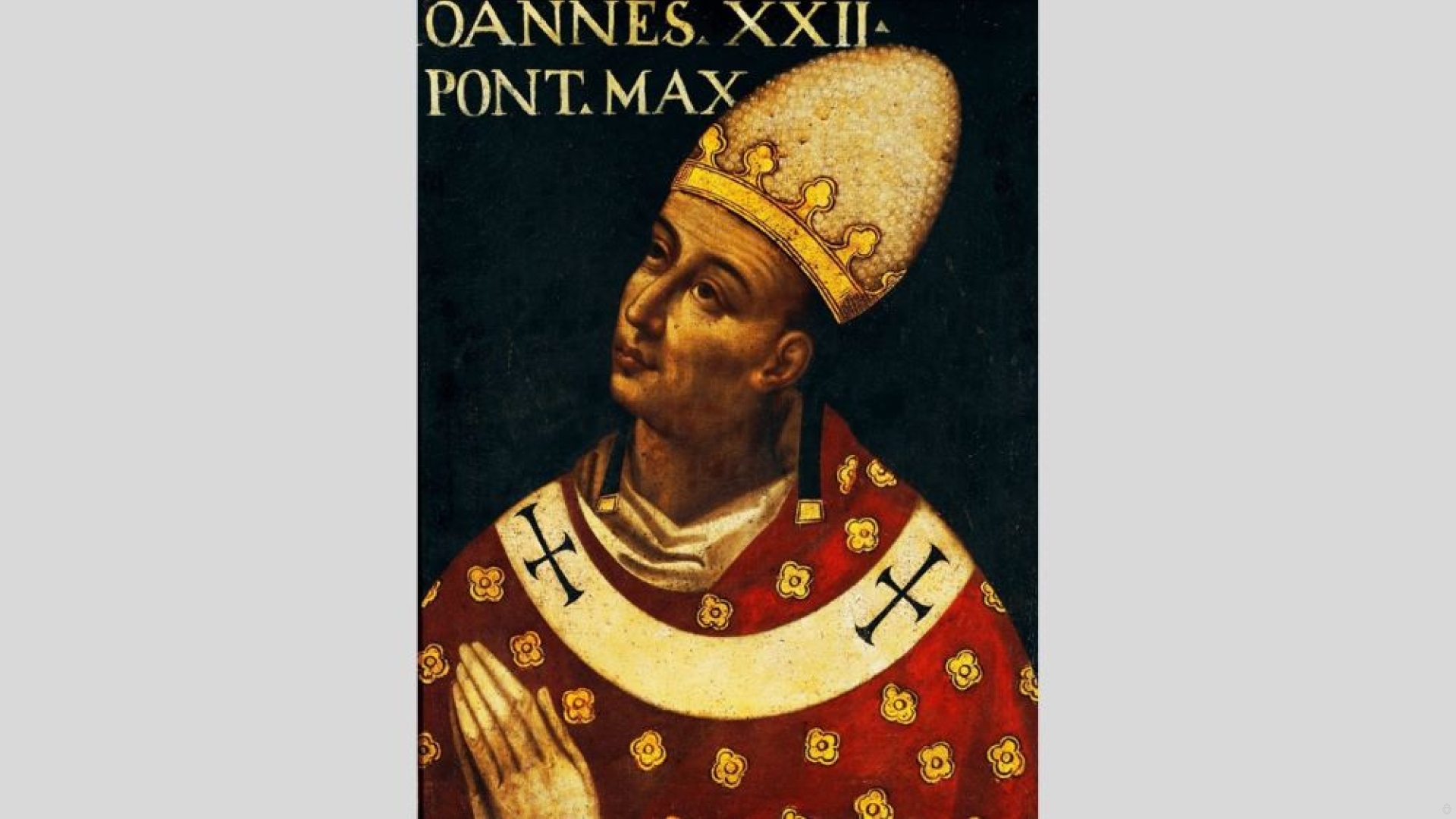
Le pape Jean XXII
Miracles in Support of His Canonization
I. The miracle of the odor of sanctity and the integrity of his body.
9. About seven months after St. Thomas Aquinas’ day of the death, after having exposed his body in St. Stephen chapel of the said monastery, it was then transferred by the monks of the same monastery to its first sepulcher, namely near the high altar of the said monastery church.
Fearing that his body would be removed from there or entirely removed from this monastery, the monks decided to exhume him again, and upon opening his tomb, still in this same St. Stephen chapel, there emanated a perfume of such a pleasant odor that it immediately spread, and the whole chapel and even the cloister of the monastery were filled with this wonderful and sweet odor.
A careful and thorough investigation by the monks proved that this outpouring of the miraculous odor was rising from the body of the saint himself. Because of this, a greater devotion arose among the monks, and their prior and some of the monks dressed themselves in their liturgical vestments, and because of what they had seen, the whole convent went in procession to transfer the body with honor to its first sepulcher.
The next day they solemnly celebrated Mass, as for a confessor, because they thought it was not proper to celebrate the Requiem Mass as if for an ordinary deceased. Many witnesses recount having perceived a similar odor, some after seven years, others after almost fourteen years, when the monks, for various causes and on various occasions, had to diligently inspect the body.
Certainly, this odor expressed the purity of his flesh which was pleasing to God, it represented the perfume of his prayers, and it revealed his clear reputation and the diffusion of his virtues and their aromas.
II. The cure of the disease of gout.
10. A surgeon, who had been ill with gout for a decade to the point that he could neither move nor walk on his own without the aid of crutches or the help of others, entrusted himself to God and to Blessed Thomas, prostrated himself on the saint’s tomb and, after having said his prayers, recovered his health, and began to jump and run, praising God for having been cured of such a long and tiring illness through the saint’s merits.
III. Healed from a horrible vision.
11. Another man, terrified by the vision of a horrible nightmare, was paralyzed from his hands to his feet, his mouth and face were even deformed, he was deprived of feeling and of all strength, so that he could not even to speak, looked like a corpse, felt nothing, even when someone set him such that his limbs were next to a fire; then he was taken to the tomb of the saint and in a short time came out from said tomb and was completely free and completely healed.
IV. The miracle of the sweet odor.
12. Another, who felt no devotion to the saint, doubly experienced the power of God through him: despising the saint, he fell ill, and the moment he repented of his fault, he recovered his health. This happened when a chaplain, to promote the cause of devotion, showed him on a monstrance several relics to be venerated, and told him that there were others even more precious, namely the hand of Brother Thomas Aquinas.
The man despised the chaplain, laughed at his words, laughed at the relics because he did not care to see them, and said: he is not a saint, but only a brother of the Order of Preachers; then behold, he was immediately seized with a trembling, and his head seemed to be enclosed in a large cyst, thick and very heavy. Corrected by this infirmity, repenting of his incredulity, and, at the same time, regretting his words, he asked and obtained pardon of the priest, and while respectfully kissing the hand of St. Thomas, he felt himself at once delivered from the trembling and the inflammation of his head.
And it was he himself who related how he had smelled a so strong and sweet an odor rising from that hand. At the touch of this hand, his head and his whole person became impregnated with the odor, which remained for a long time; and many who met him afterwards smelled that odor and demanded explanations from him; and, because of this sign, he was obliged to relate, reluctantly, the miracle which had taken place.
V. Persons cured of the infirmity of angina.
13. A certain healthy clerk, while sitting at table, was seized with severe angina which lasted two days. Because of this illness, he could no longer move his tongue and lost his speech. Despite the doctors administering many remedies to him, the disease progressed, increasing more and more, for the remedies did not reduce it, but rather aggravated it; having learned devotion to the saint, the man had himself carried to the saint’s tomb, and what he could not ask by word, he wrote with his own hand.
But his wife objected, because women were forbidden from entering the church of this monastery, so, informed that he could himself beg to be freed from his illness, he affectionately asked for the favor from this holy saint. From that moment, he was able to move his tongue, improve and recover and was completely healed in a short time.
VI. The fever gone.
14. Another, afflicted for more than seven weeks with daily fevers, liver and stomach ailments, having taken a bad turn on a Friday, heard of the miracles allegedly performed by the man of God; so the next day, Saturday afternoon, following the advice of his wife to make the devotion, in her presence, he consecrated himself devoutly to the saint; the day after, Sunday morning, he was already entirely delivered from his infirmities.
VII. A woman cured of her deafness.
15. A woman rightly feared for the life of her son, a two-month-old baby still in his crib, because over the past four months her deafness had worsened so much that, even though she was called even screamed at several times, she could barely hear her child’s loud cries; at the suggestion of her husband, who shared her sorrow and was worried about the danger that could befall their child, she dedicated herself with complete submission to the saint of God so that he might take away this infirmity; after making the vow, night fell and she fell asleep, and the next day she found herself healed by the merits of the saint as she had hoped.
VIII. A young girl cured of a throat tumor.
16. A young girl’s throat was affected by an infirmity that sapped her strength and which contracted her throat so much that it was not open enough to allow her to take solid or liquid food, and it was closed in such a way that she could breathe only with great difficulty; then, convinced by her mother, she recommended herself devoutly to the holy saint. The next day, taken to the said Fossa Nova monastery, they placed the relics of this holy man wrapped in a cloth on her throat, and immediately she felt better, ate bread and recovered her health perfectly.
IX. A lay brother cured of severe shoulder and arm pain.
17. A lay brother of the same Fossa Nova monastery, suffered from such great pains in his right arm and shoulder, that his arm, which he had kept suspended for three months in a sling, was useless to him and was extremely painful. Since the medicine he had requested from the doctors was not available and the pain was getting worse and worse, he humbly made a vow to the saint for his healing and prostrated himself on his grave; he finished by falling asleep there.
He was later awakened by another monk from the same monastery and he found his arm, which had previously rested in a sling hanging from his neck, pulled out of the linen. As one does when waking up, he raised both hands to his head to scratch himself and thus understood that he was cured; he told this to his colleagues and did not hide this remarkable miracle from those present.
X. A child recovers from a tumor.
18. A four-year-old child, stricken with a tumor, had been afflicted with such redness on his back, legs, and feet, that neither his mother nor any one else could touch his wound without him complaining. He hadn't been able to move for a month, because he was so afraid of the pain; and the doctors had no hope of curing the child except by surgery, and if it was performed, the idea still persisted that he would have a compromised future, in people's minds the prospect was very bleak.
When nature is handicapped and does not find help in recourse to medicine, it is then to be found in God, for He is glorious and works His wonders through His saints. Indeed, the mother of the child who loved him as a mother does, recommended him with devotion to St. Thomas, so that the saint could cure him of the said disease on the saint’s own merits, without an operation. The child was then taken to the monastery, placed on the tomb of the saint, and soon arose cured of his infirmity.
Statement
19. Such then, O God, are the testimonies which Thou hast rendered about this just man, and they are worthy of all Our confidence [24]. Now, if We accept the testimony of men, that of God is more powerful [25]. We believe that God already possesses his soul in heaven and We await the fruits of his intercession, We believe that he is admitted among the multitude of the Saints and, like a morning star [26], We believe that it is his place.
Thus, O Good Jesus, You nourish our faith, You strengthen our hope, You kindle the fire of charity in us. May Mother Church rejoice, may Italy rejoice, may his parents in Campania, his native land, rejoice, may the Holy Order of Preachers rejoice, may the devotion of religious resound, may the multitude of physicians applaud, may the young people renew their studies, may mature men not relax.
Let the aged rejoice in him, let all be perfected in humility, let them not abandon contemplation, let them diligently carry out the commands of God. Indeed, He gave to his heart the precepts, the law of life and discipline [27], and the wisdom of the humble raises his head [28]. For He exalted him above his companions, and in the midst of the church he opened his mouth, and the Spirit of the Lord filled him with wisdom and understanding, and clothed him in his robe of glory [29].
The Truth, which is Christ, was certainly not fictitiously offered to teachers: They that explain me shall have life everlasting [30]. Seeing as Christ is the true and proper Sun of Justice, He does not fail to illuminate the stars and make them radiate His light, for they shine because they are illuminated by Him.
He therefore resides in the inaccessible light [31], which is the splendor of His glory and the expression of His substance [32]. This is why the darkness was not left in darkness, nor abandoned, nor covered by clouds, as if they did not diffuse the ray of His brightness.
19. Further - since the order of reason postulates that the Church triumphant in heaven must be piously followed by the Church militant on earth - let them honor with proper veneration the one who has been placed in the multitude of the heaven and who knows the glory of God.
For Our part, We have examined and discussed the sanctity of the life and the authenticity of the miracles of this Confessor, not only once, but again and again, without haste, even asking the help of Our brother Cardinals of the Holy Roman Church, whose information was submitted to us for examination, with as much firmness as maturity, certainty as prudence, in investigating and examining what was there, in prevailing in this task of a procedure that is both arduous and difficult.
And hardly do we guess aright at things that are upon earth: and with labor do we find the things that are before us. But the things that are in heaven, who shall search out? [33]. Thanks to Our solicitude and that of Our Venerable Brethren, after having perfectly verified the sanctity of his life and the authenticity of the miracles performed by his merit, and after having answered all those who have humbly and piously begged Us in the presence of many prelates present at the Apostolic See, under the advice and consent of Our brother Cardinals, and under the authority of Almighty God, of the Father, of the Son, and of the Holy Ghost, and of the Holy Apostles Peter and Paul, We deem him worthy of inclusion in the catalog of Saint Confessors.
Decree
20. This is why, by this same Apostolic Letter, We exhort you all and enjoin you to celebrate with devotion, solemnity, and just veneration the feast of this Confessor, March 7, so that his pious intercession may protect us here from the dangers and enable us in the future to obtain eternal joy.
21. To make more fervent the presence of all the Christian people at the venerable tomb of this most celebrated Confessor in order to celebrate his feast together there, to all the truly contrite and confessing faithful who, each year on this day, go piously to the tomb of the Saint to ask forgiveness, We grant, by the mercy of the Almighty and by the authority of blessed Peter and Paul, the Apostles, one year and forty days of pardon.
And those who truly perform this same act of piety within seven days after the feast, We mercifully grant a hundred days of indulgence which they would still have to pay for their sins.
Given at Avignon, July 18, 1323, the seventh year of Our pontificate.
[24] Ps 92:5.
[25] 1 Jn. 5:9.
[26] Eccles. 50:6.
[27] Eccles. 45:6.
[28] Eccles. 11:1.
[29] Eccles. 15:5.
[30] Eccles. 24:31.
[31] 1 Tim 4:16.
[32] Heb 1:3.
[33] Wis 9:16.
(Source : Traduction par La Porte Latine – FSSPX.Actualités)
Illustration 1 : Photo 141311401 / Church © Zatletic | Dreamstime.com
Illustration 2 : Giuseppe Franchi (c.1550/1627 or 1628), Domaine public, via Wikimedia Commons
